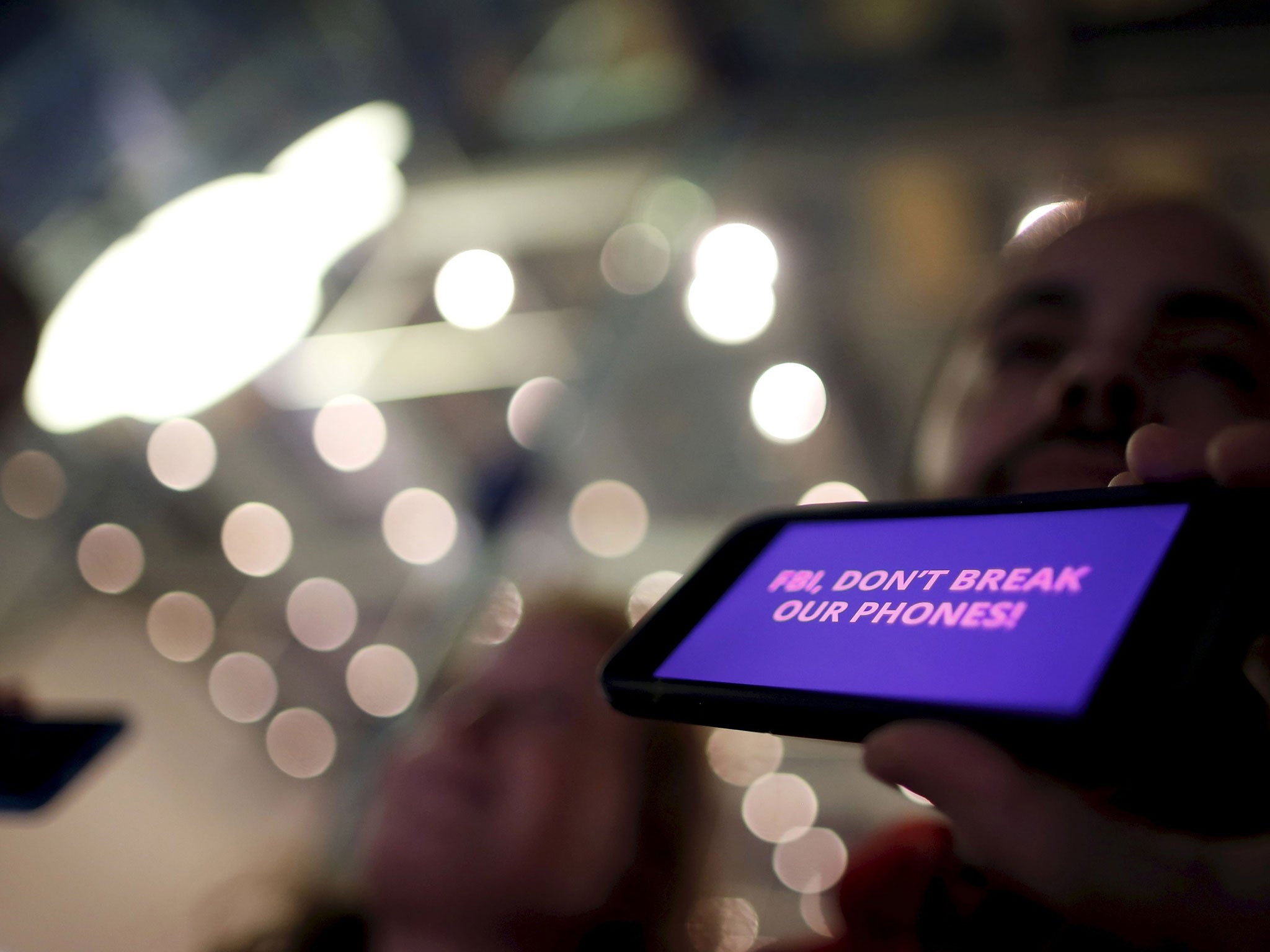We treat our snoopers with contempt – and also with confidence
In these modern battles for legitimacy, challengers to the state monopoly on access to data must wear their shining virtue like a suit of armour


The day before Apple and the FBI began their battle over iPhone privacy in Washington, I was gazing in wonder at the mosaic figure of St Thomas of Canterbury placed just below Christ himself in the cathedral apse at Monreale in Sicily. Created around 1180, very soon after the slain archbishop’s fast-track canonisation, this is the first image of Thomas Becket anywhere in Europe.
The Norman courts of Sicily and England had intimate links. Becket corresponded with his ally, Sicily’s queen regent Margaret of Navarre. His murder in Canterbury cathedral by Henry II’s thuggish knights had shocked Christendom in large part because the king had violated sanctuary. He had forcibly unlocked the door of a rival body that claimed equal or superior rights. That act ratcheted up the conflict of state against church that propels much of medieval history.
Over in DC, in the hearings of the House judicial committee, both sides harked back to the provisions of the US Constitution. Forget the 1780s. Fine minds in both camps disputed the limits of governmental power long before the 1180s. During his testimony on the agency’s attempt to compel Apple to bypass security on a phone belonging to Syed Farook, who with his wife killed 14 people in San Bernardino in December, FBI director James Comey denied the authority of any tech firm to shield data from the democratic state. Should America allow “warrant-free spaces” where the writ of public justice cannot run? Comey asked. In reply, Apple advocates such as the mathematician and engineer Professor Susan Landau argued that, once government unlocks a “back door” into iPhones, it cannot be closed. Bad guys will soon barge through it. When hi‑tech sanctuary is broken, expect murders in the cyber-cathedral.
Fans of the 1964 blockbuster Becket will fantasise about how Richard Burton would have played Apple’s defiant CEO Tim Cook, or Peter O’Toole tackled the implacable King James of the FBI. Whatever the outcome, this epic stand-off may define one of the key quarrels of its era almost as vividly as Henry II’s collision with his “turbulent priest”. On one side, the federal state asserts its primacy as the sole guardian of secrets and guarantor of security. To quote Comey’s words about Apple in front of the House committee: “It’s not their job to watch over public safety. That’s our job.” On the other, Apple appoints itself as a benign custodian and protector that keeps up an unsleeping vigil over not only the privacy but the property of its customers. As the company’s chief counsel Bruce Sewell maintained, “There is probably more information stored on that iPhone than a thief could steal by breaking into your house.”
So the stage is set for a classic crisis of legitimacy. Who, if anyone, should enjoy a monopoly on data secrecy, and on its infraction?
The technical minutiae of encryption becomes the casus belli of the information wars between government and corporations, just as arcane tussles over ecclesiastical appointments drove medieval clashes between church and state. The glorious cathedral at Monreale exists only because a troublesome archbishop fought about nomination rights with the king of Sicily, who stormed off to build a grander basilica. That pesky prelate of Palermo was another Englishman, called Walter of the Mill.
After Henry VIII broke with Rome, Walter’s native land became a European prototype for the jealous centralised authority that cracked down hard on any challenge to untrammelled royal power. That tendency persists in our secretive corridors of power. On questions of surveillance and intrusion, the state monopolists mostly have things their own way here. This week, the Home Office released the latest draft of its new Investigatory Powers Bill, the so-called “snoopers’ charter”. It would give freedom-cherishing lawmakers in Washington a fit. New provisions to permit wider “equipment interference” will reinforce the rights of police as well as security services to monitor and control smartphones and other devices – silently and invisibly. Legalised hacking is already a British speciality. This bill may let it off the lead.
After worried MPs recommended 123 changes to the measure, the fresh draft does back-pedal on a previous threat to force companies to remove encryption. Yet the ultimate aim of these powers remains a large extension of undetected intrusion. Prodded by the media and politicians into a constant state of amber alert (at least) over terrorism and paedophilia, most people in this docile land place absolute trust in our silent sentinels. Yes, those threats are real enough. So they are in the US, the difference being that the written Constitution erects a much more robust fence around individual privacy and liberty. Lawyers for Apple have cited the 1996 case of Bernstein vs Department of Justice, which established that computer code counts as speech. Therefore it enjoys protection under the First and Fifth Amendments. No one can compel a party (in this instance Apple) to speak, or to incriminate themselves.
In the US, public opinion has split into pro-FBI and pro-Apple factions. Polling by the Pew Research Center indicates that the bureau has a bare majority on its side: 51 against 38 per cent, with 11 per cent undecided. Under-thirties, meanwhile, back the Feds only by 47 to 43 per cent. Among independent voters with Democratic leanings – surely the political heartland of tech-savvy libertarians – only a third believes that Apple should submit. For all our smug pride in an ancient history of freedom, citizens of Henry VIII’s closely observed kingdom would come down much more heavily on the side of the state. Most of us prefer spooks to geeks. And those shadowy custodians now plan for blanket prior surveillance that will prevent a locked-phone terrorism case from ever reaching the courts.
In matters of privacy and secrecy, Britain remains the island of paradox. The majority voices scorn and resentment against government, politicians, tax-avoiding corporations. Yet that same majority trusts the lot of them – whether public and private bodies – with bundles of sensitive information, and exhibits zero interest in democratic oversight of the new lords of data. This credit not only applies to state agencies under parliamentary supervision, or tech giants that genuinely wish to bury our vital statistics in the dungeons of super-strength encryption. Here, millions of trusting souls will happily tap a virtual life story into a supermarket website. Germans, for instance, express amazement at our touching faith in the virtue of so many institutions. Britons’ everyday grumbling hides a deep vein of innocence. Some would call that a blessing of history.
How can a society that treats the keepers of secrets with both contempt and confidence square that circle? Myth rides to the rescue. The institution may be pitiless, corrupt or stupidly bureaucratic. Yet it hosts or assists a handful of heroes who work bravely for the public good. Look at the novels of John le Carré, where those “honourable schoolboys” in and around the secret service strive to do the right thing in the teeth of cynicism, deceit and treachery. Now running to acclaim on Sunday evenings, the BBC adaptation of The Night Manager directed by Susanne Bier proves how tenacious and attractive the Le Carré model can be. If it ever starts to feel stale, a timely tweak can restore the vim. Thus Le Carré’s noble spy Leonard Burr has evolved into Angela Burr.
Lone crusaders take the place of constitutions. Toiling in the shadows, upright chaps – or chapesses – will look after us. The state may abuse its monopoly on violence, subterfuge and secrecy. But we can count on elements within it to act justly for the common good. However, the rival princes of privacy in tech companies also wield this line of reasoning – or perhaps fantasy.
Google began its global conquest beneath a virtual banner that read: “Don’t be evil.” Appeals to the decency and honour of its leaders serve as weapons when the likes of Apple, Facebook or Google face scrutiny. Their hi-tech haloes also boost the stock price. Apple’s arguments to the House committee this week turned on the contrast between its impeccable credentials as caretaker of our secrets, and the malice of the crooks, frauds and dictators who would stampede through that shattered “back door” if iPhones could be opened on a writ.
In these modern battles for legitimacy, challengers to the state monopoly of access to data must wear their shining virtue like a suit of armour. Becket, and other medieval rebels against royal authority, did exactly that. Their motives, though, were invariably mixed. Pride, empire-building, ambition or acquisition drove ecclesiastical breakaways just as much as Christian piety.
In the same way, sceptics see Apple’s resistance to the FBI as a ploy to lock obedient users more securely into its ever-growing “ecosystem” of devices and services. It asks for long-term – and lucrative – loyalty in exchange for the privacy it claims to guard. On balance, Cook and his digital clergy may be right to stand up to the Feds. But the sanctuary they offer from state intrusion will come with a steep price tag: submission to another would-be monopoly. As T S Eliot’s play about Thomas Becket, Murder in the Cathedral, warns: “The last temptation is the greatest treason/ To do the right deed for the wrong reason.”




Join our commenting forum
Join thought-provoking conversations, follow other Independent readers and see their replies